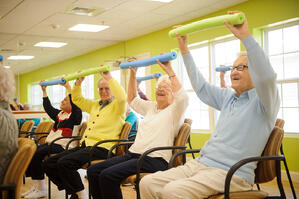Keeping Senior Hearts Healthy During American Heart Month
assisted living | Aging & Caregiving
 While cardiovascular health is important for everyone, it is a particular concern for seniors: as many as 42.2 million Americans aged 60 or older have some form of heart disease, according to the American Heart Association.
While cardiovascular health is important for everyone, it is a particular concern for seniors: as many as 42.2 million Americans aged 60 or older have some form of heart disease, according to the American Heart Association.
The observation of American Heart Month in February offers the perfect opportunity to learn more about cardiovascular disease, its risk factors, and preventative measures which can help safeguard your aging loved one’s heart health.
About Heart Disease
The country's leading cause of death for both men and women, heart disease is an umbrella term used to cover a range of heart-related health conditions.
Coronary artery disease (CAD) tops this list, and can lead to a number of different cardiovascular events, including chest pain, arrhythmia, heart attack and heart failure. Every year as many as 500,000 seniors die in the U.S. due to heart disease.
The Warning Signs
Unfortunately, symptoms of heart disease don’t usually appear until a major heart incident occurs. The following warning signs may indicate an impending heart attack or other emergency: faintness, weakness and or light-headedness, breathlessness, nausea, indigestion, chest pain or discomfort, sweating, an irregular heartbeat, and pain in surrounding areas, including the neck, shoulders and back.
Reducing Risk
Many people believe that heart disease is an inevitable part of aging, but healthy lifestyle behaviors and a heart-healthy diet can reduce the cardiovascular conditions which lead to heart disease. Encourage your loved one to eat a plant-based diet. And don't forget exercise: even a brief walk has lasting heart health benefits.
It's also important to keep blood pressure and cholesterol levels within acceptable ranges, control diabetes, and take medicine for angina, if prescribed by a physician. Smoking, alcohol consumption and stress can also add to the risk of heart disease.
The Physician’s Role
Doctors are a valuable resource when it comes to promoting cardiovascular wellness in seniors. Your aging loved one’s physician can help formulate a safe, effective plan designed to get him/her on the path to wellness.
If necessary, he/she can also prescribe medication, such as beta-blockers or nitrates, to manage the condition. Some doctors also recommend aspirin as a routine preventative measure.
It’s never too late to make positive lifestyle changes so take time this month during American Heart Month to help your aging loved ones enjoy better cardiovascular health. Their hearts will thank you for it!
Key Takeaways
- While cardiovascular disease is common in seniors, it doesn’t have to be a fact of life.
- Healthy lifestyle choices can help prevent heart conditions, including CAD.
- Talk to your aging loved one’s doctor about a preventative plan to defend against heart disease.
- If prescribed by your doctor, prescription meds and aspirin can help keep cardiovascular issues in check.
About Marissa Salvesen
My journey into the world of senior living began when I started working for United Methodist Homes in 2010. Starting as an Activities Director at one of our award-winning assisted and independent living communities and then transitioning to Marketing and Promotions Manager for UMH, I now work as the Manager of Mission Development, fostering the Mission and Values of our organization. I love sharing stories about the many ways we build meaningful relationships and enrich the lives of those we serve, and am proud to be part of building UMH’s 140-year legacy of caring. Wondering what makes our communities such special places to live and work? Connect with me and find out!

Our Blog is a 2016 Platinum Generations Award Winner! The Generations Award is an annual international competition for excellence in senior marketing recognizing professionals who have communicated to the 50+ Mature Markets.



